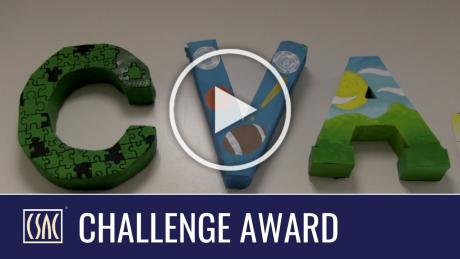In San Luis Obispo County, There’s a New – and Effective — Way of Working with High-Risk Youth
CSAC is spotlighting this 2019 Challenge Award program, which was in place prior to the COVID-19 pandemic.
Click here to view a video about this program
There was a time when Shea never thought he would see his 20th birthday due to his addiction. Now 18, he is looking forward to getting a college degree and living a drug-free life. That transformation did not come easy. It took a comprehensive criminal-justice program in San Luis Obispo County that provides structured treatment services to juvenile offenders.Located within the County’s Juvenile Hall, the Coastal Valley Academy (CVA) is a co-ed probation camp program designed as an alternative to group homes for youths who are considered having a high risk of offending. CVA is not your typical juvenile hall setting; in some ways, it resembles a homelike setting. But don’t mistake this for a country club. The camp is locked and the youths are expected to follow a strong set of rules as part of a structured program.
Rather than continuing the previous practice of sending offending youths to group homes far away from their homes, the County now has the Coastal Valley Academy that provides schooling and wraparound services. Being able to stay closer to home allows for valuable interactions with family members, home passes, family treatment, transition planning, and linkages to wraparound services.
San Luis Obispo County Chief Probation Officer Jim Salio talks how group homes are both costly and often ineffective in meeting the needs of high-risk youth. His goal is to completely eliminate the County practice of sending wards of the court to group homes and having those funds reallocated to the highly-effective Academy.
“We have not place any wards of the court in group homes for the last two years,” Chief Salio says proudly.
At the Coastal Valley Academy, the focus is on treating “the whole child” – a phrase we heard time and time again during a recent visit. Probation officers, a teacher, a therapist and other staff all work together to help the youth in all aspects of their lives.
“They need medical services, they need psychological services. They need people who are educated in trauma-informed practices,” explains Juvenile Court Judge Charles Crandall. “And they get that here.”
The program’s results are impressive. All of the youths who have participated in the program have received cognitive behavioral treatment and life skills development training. The total reduction in risk of recidivism among CVA youths has dropped by about half. But beyond the figures, you just have to talk with youths to learn how the program is helping to turn their lives around.
CVA’s success is a result of a strong partnership between county juvenile justice and mental health departments, the County Office of Education and local organizations.
“It’s all about helping (the youths) be successful,” says Therapist Kimberly Burnett, who works with the youths daily.
“Our goal is to turn them around, deal with their past trauma and get them squared away,” Judge Crandall adds
The strong and positive relationship between the wards and probation officers was evident during a recent visit. Beyond school and regular therapy sessions, the youths participate in a number of pro-social replacement activities, including running, hiking and community service that helps improve the youths’ reasoning and avoidance skills.
“I am doing really well because they set me up to do really well,” says Triston, who is participating in the Academy’s After Care program. He now has a job and an apartment, steps the program helped him achieve.
“They are going to learn to make better decisions and they are going to see there is hope for them in the future,” says Chief Deputy Marguerite Harris, Juvenile Hall Superintendent, adding that their pasts are not going to determine their future.
Those words are echoed by Greg Murphy, who teaches at the Academy. “They can see the light at the end of the tunnel. Their prospects become hopeful again.”
To learn about how to enter the 2020 CSAC Challenge Awards, click here. The entry deadline is Sept. 11, 2020.













































